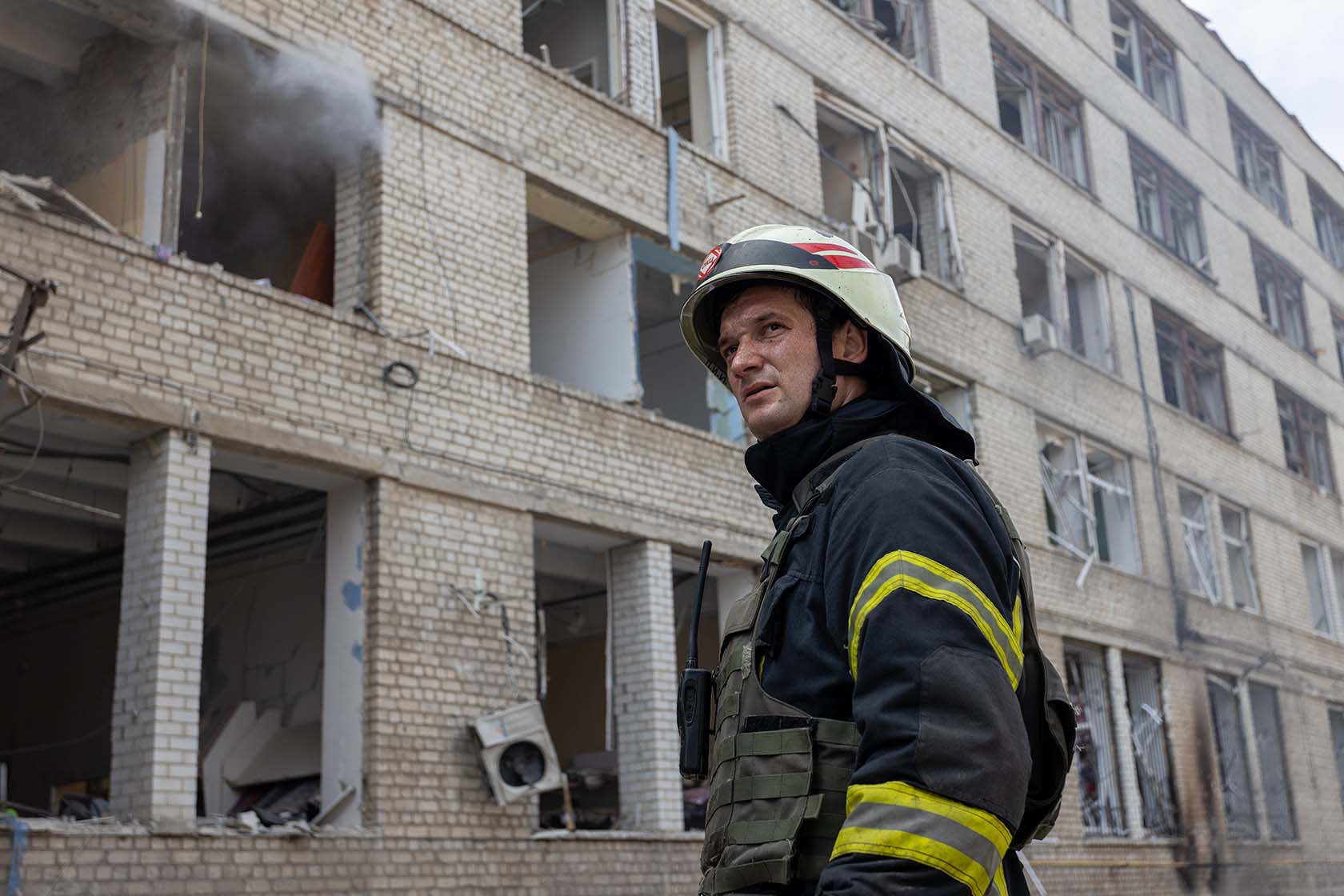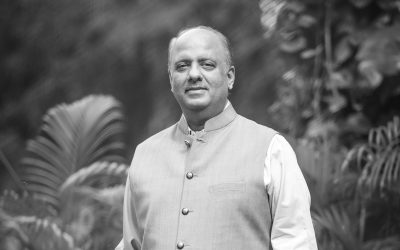I never thought I would find myself at the centre of a massive tragedy and trying to do a little bit to help the people of Ukraine.”
Those are the words of retired consultant Dr John Philip, who has been at the forefront of efforts to provide humanitarian relief to the war-torn country as Chairman of the International Rotary Fellowship of Healthcare Professionals.
Listen to this article
Ever since the Russian invasion in February, this group of Rotarians drawn from across the world, has been working closely with doctors in Ukraine. They are not only providing medical equipment, but training too.
In April, 3,850 Ukrainian doctors joined a training session organised by the Fellowship to tackle the management of blast injuries. That recording has since been viewed 10,000 times.
“I think this is Rotary at its best,” explained John, a member of Newbury Rotary in Berkshire. “We had a choice of closing our eyes and living in our comfort zone. But we got involved.
“For me, personally, it was a big step, as an individual wanting to help our Rotary colleagues and our doctor colleagues in Ukraine. But suddenly, collectively, the message had power. Because I stepped forward in the name of Rotary and because of that, people took notice of me.”
John is one part of a collaborative effort under the umbrella of the Rotary GB&I Ukraine Taskforce.
Sometimes, as Rotarians, we are looking for projects to do. The dreadful situation in Ukraine has provided that focus. This has enabled us to really prove how important Rotary is worldwide.”
Chaired by Jersey Rotarian, Allan Smith, it provides a co-ordinated approach to the crisis – firstly, providing humanitarian aid to Ukraine and bordering countries, and secondly assisting displaced people in Ukraine, as well as refugees seeking sanctuary in these isles.
The Rotary GB&I team responsible for refugees is the resilience team which is co-led by Brenda Parsons and Peter Dowse.
“Sometimes, as Rotarians, we are looking for projects to do,” explained Allan Smith. “The dreadful situation in Ukraine has provided that focus.
“This has enabled us to really prove how important Rotary is worldwide.” For Dr John Philip, that impact is being firmly felt on the frontline.
“Our focus at the very beginning was to deliver medical aid to the people of Ukraine,” he said. “And we made a decision to deliver that aid through Rotarian doctors working in Ukraine.
“For obvious reasons, emergency medical aid has dominated our thinking for what we call polytrauma.
“Some of the injuries which people are suffering are so horrendous to see. We have been able to assist with doctors to manage some of the very complicated injuries which people have been suffering.”
John and his team of medical practitioners drawn from across Europe meet online with their Ukrainian counterparts once a week.
They gather information about what is needed in the country’s hospitals and the Fellowship gather together the aid.


“Our focus at the very beginning was to deliver medical aid to the people of Ukraine and we made a decision to deliver that aid through Rotarian doctors working in Ukraine.”
“In terms of managing polytrauma, we have been supplying tourniquets and other devices to manage shrapnel injuries.
“And we have been able to supply a large amount of equipment to hospitals at the request of local Rotarians.”
Since February, the Fellowship has raised nearly £200,000, and in the first couple of months provided more than £80,000 in life-saving equipment and supplies.
But it is the connection of Rotarians which has enabled the Fellowship to partner with medical manufacturers who have generously donated equipment.
One example was shipping out an x-ray machine to identify shrapnel injuries.
A Rotarian who is a Chief Executive of Siemens in Austria heard of the need and the company delivered four machines valued at €500,000 free of charge.
John and his team identified a machine needed in a Ukrainian hospital for premature babies costing €60,000 and Rotarian contacts in Italy provided the equipment without cost.
The Fellowship is currently in discussions with acquiring medical instruments from another international company.
There are quite a few specialists who are working with us to advise what is possible to support the medical teams in Ukraine.”
“We have been told there are a lot of pregnant mothers who are giving birth to underweight children born prematurely,” added John.
“That’s not entirely surprising when you think about the conditions they have been living through.
“The Ukrainians wanted a large number of specialised equipment to keep these babies alive in vulnerable conditions.
“So we have been able to provide special resuscitation equipment to 35 neonatal units.
“But alongside this, there are also other medical issues to consider; people with chronic diseases, people with diabetes and other diseases.
“We have been able to highlight the importance of caring for people with nonemergency conditions as well.
“And we have discussed about internally displaced children being unvaccinated or under-vaccinated. We are currently discussing the possibility of working with UNICEF to launch a vaccination programme with Ukraine.”
Medical staff are working under the most extreme conditions, with the World Health Organization pointing out that dozens of Ukrainian medical facilities have been hit in airstrikes.
The International Rotary Fellowship of Healthcare Professionals has also been putting together pastoral support for the doctors who are suffering emotionally.
“We never sought and we never thought we would have this position,” said John.
“But because of our proximity and connectivity we have started to gain an international reputation.
“We are now working with American and Canadian doctors.
“There are quite a few specialists who are working with us to advise what is possible to support the medical teams in Ukraine. We have got our team of doctors and pharmacists from the UK, Austria, Germany, Poland, and almost all of the frontline countries.
“Because we have got safe transit routes sorted out, we have been able to offer logistical advice to several Rotary teams in the United States to transfer safely medical goods into Poland and, from there, into Ukraine.
“People are taking notice that we have the right kind of people in Ukraine, as well as the right kind of strategy to make sure we can target medical aid to the appropriate places in the appropriate manner.
We had a choice of closing our eyes and living in our comfort zone. But we got involved.”
“There are many other medical charities which do not have that connectivity.
“And I think when other organisations collect or buy things, they can dump them in border warehouses without knowing where they will end up.
“Whereas, if we get a request for tourniquets, we can target them to specific places. Currently we are supplying 2,000 tourniquets each week. We could afford to buy 20,000, but we won’t do that. It’s that kind of specific targeted action which has enabled us to maximise our impact.
“There is no wastage. None of the things we are supplying are sitting in warehouses or in boxes.”
John said he wanted to thank Rotarians in Great Britain and Ireland for their financial support. But they need more. “We need more money because we are in this for the long term,” he pointed out.
“The immediate needs are being met, but we are looking into the future.
“We want to be standing with the doctors in Ukraine, Rotarians and non-Rotarians, to rebuild the health service, offering them support, the training and medical education.
“We want to be thinking big, and we want Rotary to be there. We want Rotary to be a big player in the reconstruction of the health service in the Ukraine.”


























































